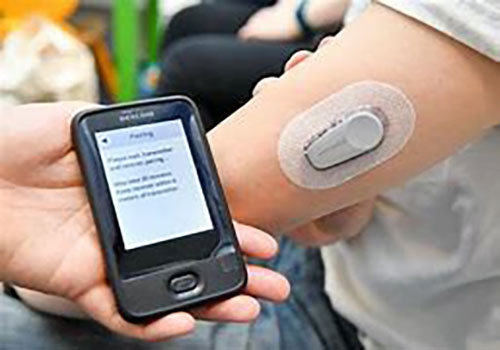You are here
Home ›November is Diabetes Month; CGM becoming more accessible for people living with diabetes

Continuous Glucose Monitoring ... November is Diabetes Month. Continuous Glucose Monitoring (CGM) is on the rise and is now much more affordable. These small units, as pictured above, help understand glucose trends so you can better manage eating, exercise and medication, provide more comfort at night if you worry about low blood sugars while you sleep, even alarming you to wake up when sugars are too low or too high, and understand the importance of taking medication and the timing of medication. Submitted photo.
by Angie Mettille, RN/BSN, Certified Diabetes Educator
It is likely that you’ve heard the term CGM, but may not be sure what it means. Maybe you have noticed some people in the community with a white circular device on the back of their arm and have wondered what it was.
A continuous glucose monitoring system (CGM) is a device that allows for constant monitoring of blood glucose (sugar) levels. CGM gives you, as a person with diabetes (or a person caring for someone with diabetes), an easy, at-a-glance way to access your blood sugar levels 24 hours a day, with minimal pokes and needles.
As many people living with diabetes know, checking their blood sugar is a critical piece of diabetes management. CGM systems have been shown to help people keep glucose levels stable, reducing episodes of both low and high blood sugars, and therefore decreasing the risk of complications from diabetes.
Unlike traditional blood glucose meters that give your blood sugar results for one moment in time, CGM tells you where your current blood sugar levels are, where they’ve been, and what direction they are going. There are also alarms on these devices that can alert you when your blood sugar is low or high, keeping you safe, and helping you make treatment decisions related to your blood sugar.
Most of us are familiar with traditional glucometers, which require a drop of blood from under the skin or from a fingerstick. CGM continuously checks the glucose level in the thin layer of fluid under the skin, even while you sleep.
A CGM can help:
• understand glucose trends so you can better manage eating, exercise and medication.
• provide more comfort at night if you worry about low blood sugars while you sleep
• understand the importance of taking medication and the timing of medication
CGM is also very useful to your diabetes care team by helping them make treatment decisions on what medications need to be adjusted to keep your blood sugar under best control. Stable blood sugars help you feel at your best, providing better energy levels and mental clarity.
Many people could benefit from a CGM, including:
• people with Type 1 Diabetes taking insulin via injections or pumps.
• people with Type 2 Diabetes taking insulin via injections or pumps and/or have frequent episodes of very low blood sugar levels.
• people who have trouble recognizing the symptoms of low blood sugars (hypoglycemia unawareness).
• people who often have wide blood sugar variations.
• people who would like to have more information to improve their daily blood sugar numbers.
Luckily, insurance companies are starting to recognize the benefits of CGM and have made some large improvements on coverage for their patients in 2023. CGM supplies are available with a prescription only and are sometimes even able to be filled at your local pharmacy, depending on your insurance benefits.
Some people living with diabetes have even decided that paying cash for the device is worth it as it is a useful tool for them, and they recognize the health benefits from using CGM. VMH Diabetes Education can help you navigate what CGM device your insurance best covers and from where. The team can also help train you on how to use the device so you feel comfortable placing the sensors at home, and interpreting the data the CGM provides to you.
If CGM is not found to be affordable to use continuously at home, an outpatient CGM study can also be ordered by your primary care provider or specialist to be performed at VMH. This will provide two weeks of blood sugar data to be interpreted by your diabetes care team to make treatment decisions that are best for you.
If you think CGM may be an option for you, contact Veterans Memorial Hospital Diabetes Education at 563-568-3411.

